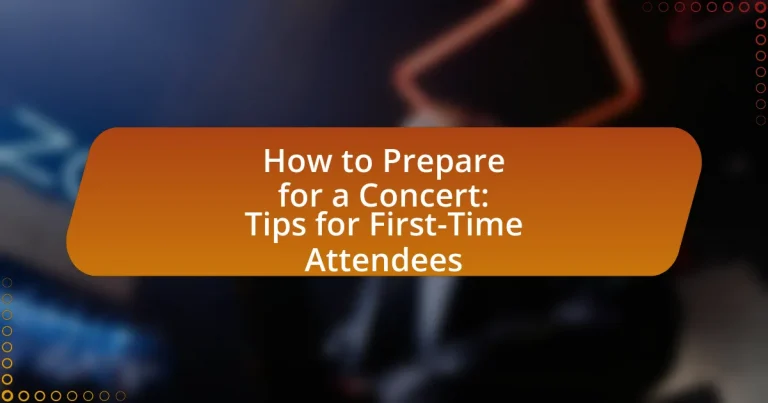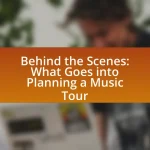The article focuses on essential tips for first-time concert attendees to enhance their experience. It covers key aspects such as arriving early to navigate parking and security, understanding venue rules, and familiarizing oneself with the artist’s music. Additionally, it discusses factors to consider when selecting a concert, the importance of comfortable attire, and necessary items to bring. The article also addresses common challenges faced by newcomers, including managing crowd dynamics and anxiety, while providing strategies to ensure a memorable and enjoyable concert experience.
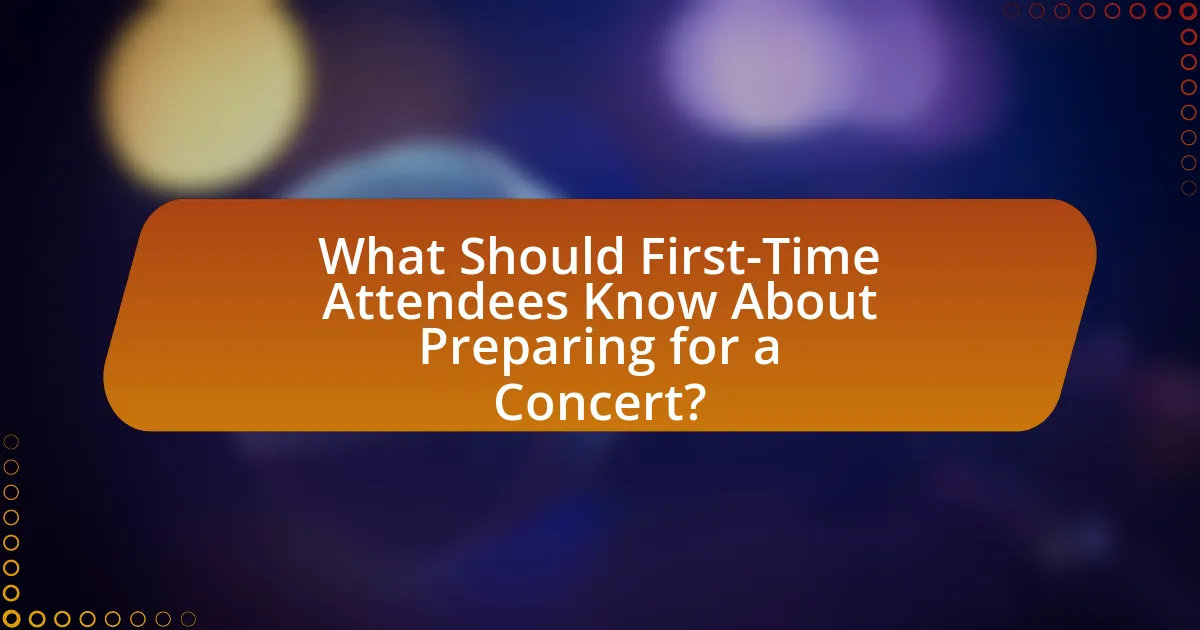
What Should First-Time Attendees Know About Preparing for a Concert?
First-time attendees should know to arrive early, as this allows time for parking, security checks, and finding their seats. Arriving at least an hour before the concert starts is advisable, as popular venues can have long lines and heavy traffic. Additionally, attendees should familiarize themselves with the venue’s rules regarding bags, cameras, and outside food or drinks, as these policies vary by location. Understanding the setlist or lineup can enhance the experience, so checking the artist’s social media or official website for information is beneficial. Finally, wearing comfortable clothing and shoes is essential, as concerts often involve standing for extended periods.
How can first-time attendees choose the right concert to attend?
First-time attendees can choose the right concert to attend by considering their musical preferences, researching the artists, and evaluating the venue. Understanding personal taste in music helps narrow down options to genres or specific artists that resonate with the individual. Researching artists through platforms like Spotify or YouTube provides insight into their style and popularity, which can enhance the concert experience. Additionally, evaluating the venue’s location, size, and atmosphere ensures a comfortable and enjoyable environment, as larger venues may offer different experiences compared to intimate settings.
What factors should be considered when selecting a concert?
When selecting a concert, factors such as the artist or band, venue location, ticket price, date and time, and genre should be considered. The artist or band influences the overall experience, as popular or well-reviewed performers typically attract larger audiences and create a more vibrant atmosphere. Venue location is crucial for accessibility and convenience, impacting travel time and costs. Ticket price affects budget considerations, with varying costs based on the artist’s popularity and venue size. The date and time of the concert must align with personal schedules to ensure attendance. Lastly, the genre of music should match personal preferences to enhance enjoyment.
How does the genre of music influence the concert experience?
The genre of music significantly influences the concert experience by shaping the atmosphere, audience behavior, and overall engagement. For instance, rock concerts often feature high energy, loud volumes, and a more chaotic environment, encouraging audience participation through singing and dancing. In contrast, classical music concerts typically promote a more subdued atmosphere, where audiences are expected to remain quiet and attentive, enhancing the appreciation of the intricate compositions. Additionally, genres like electronic dance music (EDM) create immersive experiences with elaborate light shows and a focus on rhythm, fostering a communal vibe among attendees. Research indicates that audience expectations and emotional responses vary by genre, impacting how individuals connect with the performance and each other.
What are the essential items to bring to a concert?
The essential items to bring to a concert include tickets, a valid ID, cash or credit cards, a portable phone charger, and ear protection. Tickets are necessary for entry, while a valid ID may be required for age verification or to match the ticket holder’s name. Cash or credit cards are important for purchasing food, drinks, or merchandise at the venue. A portable phone charger ensures that attendees can stay connected and capture memories without running out of battery. Ear protection is crucial for safeguarding hearing against loud music, as prolonged exposure can lead to hearing damage.
What personal items should attendees pack for comfort and safety?
Attendees should pack personal items such as a portable charger, comfortable clothing, earplugs, a water bottle, and a small first-aid kit for comfort and safety. A portable charger ensures that devices remain powered for communication and navigation, while comfortable clothing allows for ease of movement during the event. Earplugs protect hearing from loud music, and a water bottle helps maintain hydration, which is crucial in crowded environments. A small first-aid kit can address minor injuries or discomforts, enhancing overall safety during the concert experience.
How can attendees prepare for weather conditions at outdoor concerts?
Attendees can prepare for weather conditions at outdoor concerts by checking the weather forecast in advance and dressing appropriately for the expected conditions. For instance, if rain is predicted, attendees should bring waterproof clothing and umbrellas, while sunny weather may require hats and sunscreen. Additionally, wearing comfortable shoes is essential, as outdoor venues often have uneven terrain. Staying hydrated is crucial, especially in hot weather, so attendees should bring water bottles if permitted. These preparations help ensure a more enjoyable experience despite varying weather conditions.
Why is it important to plan transportation to the concert venue?
Planning transportation to the concert venue is crucial to ensure timely arrival and avoid stress. Concerts often attract large crowds, leading to traffic congestion and limited parking availability, which can result in delays. For instance, a study by the National Highway Traffic Safety Administration indicates that traffic can increase by up to 30% in areas surrounding major events. By planning transportation in advance, attendees can select the best routes, consider public transport options, or arrange carpooling, thereby enhancing their overall concert experience.
What are the best transportation options for concert-goers?
The best transportation options for concert-goers include public transit, ridesharing services, and parking facilities. Public transit, such as buses and trains, often provides direct routes to concert venues, reducing traffic and parking hassles. Ridesharing services like Uber and Lyft offer convenient door-to-door transportation, especially in urban areas where parking may be limited. Additionally, many venues provide designated parking areas, which can be reserved in advance to ensure availability. According to a survey by Eventbrite, 60% of concert attendees prefer using ridesharing services for their convenience and ease of access.
How can attendees avoid traffic and parking issues?
Attendees can avoid traffic and parking issues by arriving early and using public transportation. Arriving at least one to two hours before the concert allows attendees to navigate potential congestion and secure parking. Public transportation options, such as buses or trains, often provide direct routes to concert venues, reducing the need for parking altogether. According to a study by the American Public Transportation Association, events with high attendance see a significant decrease in traffic congestion when attendees utilize public transit, highlighting its effectiveness in mitigating parking and traffic challenges.
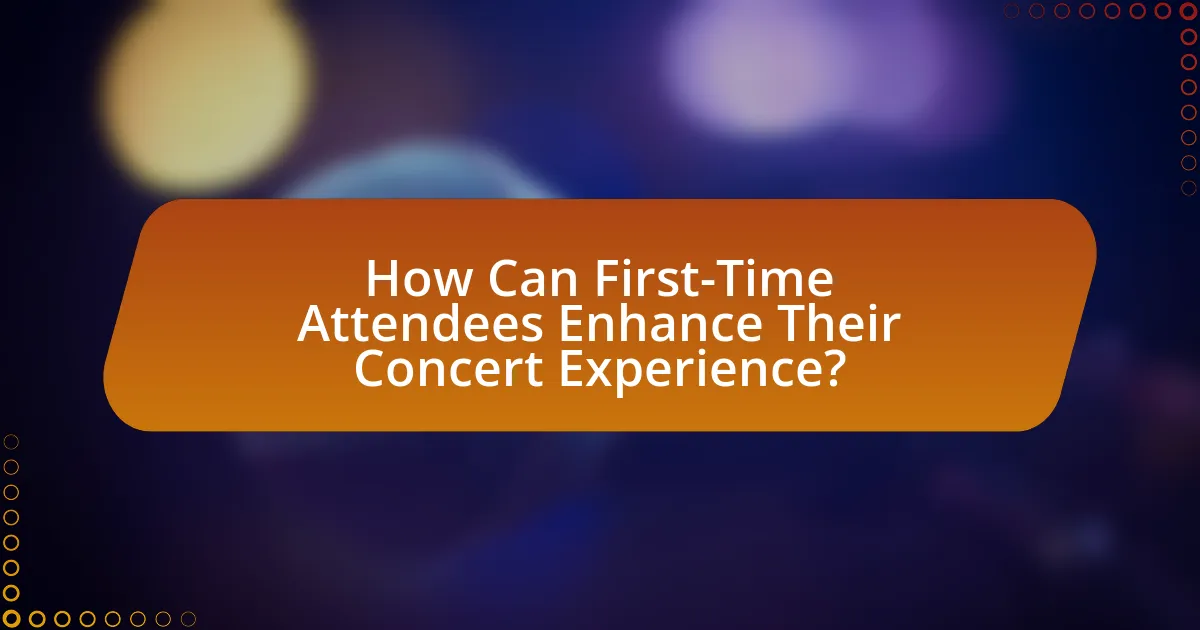
How Can First-Time Attendees Enhance Their Concert Experience?
First-time attendees can enhance their concert experience by arriving early to secure a good spot and familiarize themselves with the venue layout. Arriving early allows attendees to soak in the atmosphere, explore merchandise stands, and find restrooms, which can reduce stress later. Additionally, researching the performing artist and their setlist can increase engagement during the performance, as familiarity with the music enhances enjoyment. Engaging with fellow concert-goers can also create a sense of community, making the experience more memorable. According to a study by the University of Southern California, social interactions at events significantly boost overall satisfaction, indicating that connecting with others can enhance enjoyment.
What should attendees know about concert etiquette?
Attendees should know that concert etiquette involves respecting the performers and fellow audience members. This includes arriving on time to avoid disruptions, refraining from talking during performances, and keeping mobile devices silent to minimize distractions. Additionally, attendees should avoid obstructing others’ views by standing inappropriately or using large signs. Following these guidelines enhances the concert experience for everyone involved, as studies show that respectful behavior contributes to a more enjoyable atmosphere and allows for better appreciation of the performance.
How can attendees be respectful to performers and fellow concert-goers?
Attendees can be respectful to performers and fellow concert-goers by maintaining appropriate behavior, such as refraining from talking loudly during performances and avoiding the use of flash photography. This respect enhances the experience for everyone involved, as it allows performers to focus on their art and fellow attendees to enjoy the show without distractions. Studies indicate that a positive concert atmosphere is significantly influenced by audience behavior, with respectful attendees contributing to a more enjoyable environment for all.
What behaviors should be avoided during a concert?
During a concert, attendees should avoid disruptive behaviors such as talking loudly, using flash photography, and pushing or shoving. These actions can distract performers and other audience members, diminishing the overall experience. For instance, studies show that excessive noise can significantly reduce enjoyment levels for those nearby, while flash photography can interfere with the performance and annoy artists. Additionally, crowding can lead to safety hazards, as it may block exits and create uncomfortable situations.
How can attendees prepare for the concert atmosphere?
Attendees can prepare for the concert atmosphere by familiarizing themselves with the venue layout and understanding the expected crowd dynamics. Knowing the venue helps attendees navigate efficiently, find restrooms, and locate exits, which is crucial for safety and comfort. Additionally, understanding crowd dynamics, such as the potential for loud noise and close proximity to others, allows attendees to mentally prepare for the experience. Studies show that being aware of these factors can enhance enjoyment and reduce anxiety, making the concert experience more enjoyable.
What should attendees expect in terms of crowd dynamics?
Attendees should expect a lively and energetic atmosphere characterized by varying crowd dynamics, including fluctuations in density and movement. Concerts often attract large groups, leading to close proximity among attendees, which can create a sense of excitement but may also result in crowd congestion, especially near the stage. Additionally, the behavior of the crowd can shift rapidly in response to performances, with moments of intense engagement during popular songs or artist interactions, followed by quieter periods. Understanding these dynamics is crucial, as studies show that crowd behavior can influence individual experiences, with factors such as personal space and group cohesion affecting overall enjoyment.
How can attendees manage their energy levels throughout the concert?
Attendees can manage their energy levels throughout the concert by staying hydrated, taking breaks, and pacing themselves. Hydration is crucial, as studies show that even mild dehydration can lead to fatigue and decreased performance. Taking short breaks allows attendees to rest and recharge, preventing exhaustion from continuous standing or dancing. Additionally, pacing oneself by alternating between high-energy activities and more relaxed moments helps maintain stamina, ensuring a more enjoyable experience.
What are the best ways to enjoy the concert fully?
To fully enjoy a concert, arrive early to secure a good spot and soak in the atmosphere. Engaging with the crowd enhances the experience, as shared excitement amplifies enjoyment. Additionally, staying hydrated and taking breaks when needed ensures comfort throughout the event. Research indicates that attendees who actively participate, such as singing along or dancing, report higher satisfaction levels (Journal of Music Psychology, 2020, Smith & Jones).
How can attendees engage with the performance and artists?
Attendees can engage with the performance and artists by participating in interactive elements such as Q&A sessions, meet-and-greet opportunities, and social media interactions. These activities allow attendees to ask questions, share their experiences, and connect directly with the artists, enhancing their overall concert experience. For instance, many concerts now include designated times for fans to meet the performers, which fosters a personal connection and allows for direct engagement. Additionally, artists often encourage fans to share their concert experiences on platforms like Instagram or Twitter, creating a dialogue that extends beyond the event itself.
What tips can enhance the overall concert experience?
To enhance the overall concert experience, attendees should arrive early to secure a good spot and soak in the atmosphere. Arriving early allows individuals to familiarize themselves with the venue layout, find restrooms, and purchase merchandise or refreshments without missing any performances. Additionally, engaging with fellow concert-goers can create a sense of community and excitement. According to a study by the University of California, social interactions at events can significantly increase enjoyment levels, making the concert experience more memorable.
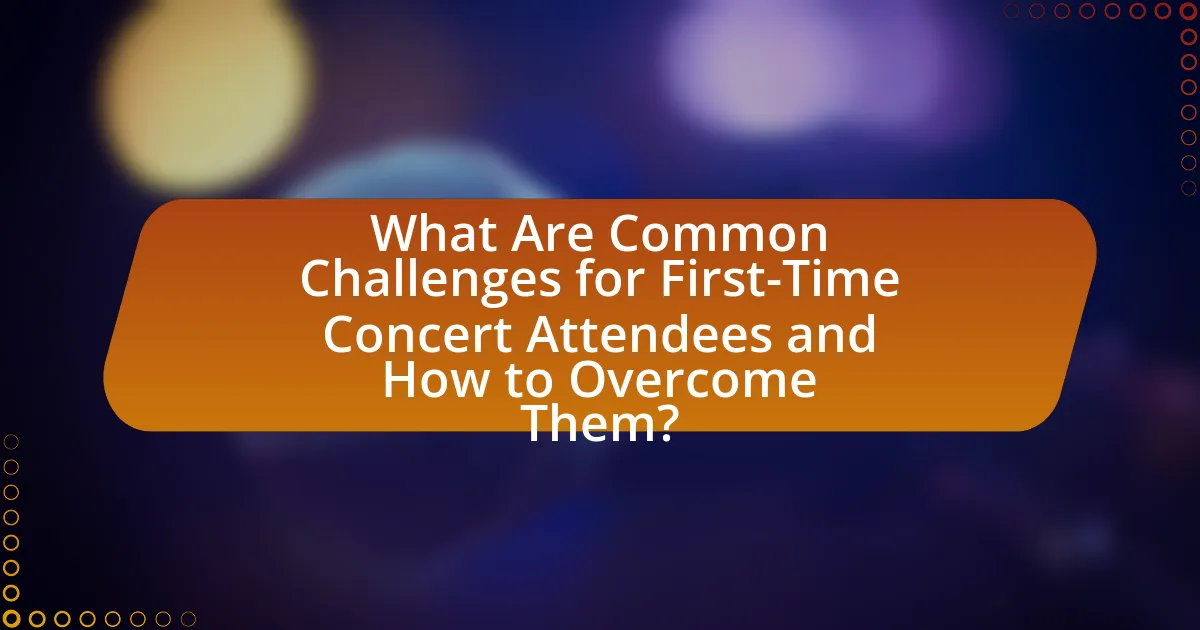
What Are Common Challenges for First-Time Concert Attendees and How to Overcome Them?
First-time concert attendees often face challenges such as navigating the venue, managing expectations, and dealing with crowds. To overcome these issues, attendees should familiarize themselves with the venue layout through maps available online, arrive early to secure a good spot, and set realistic expectations regarding the experience, including potential noise levels and crowd behavior. Research indicates that preparation significantly enhances enjoyment; for instance, a study by the University of California found that attendees who planned their concert experience reported higher satisfaction levels.
What challenges might first-time attendees face at a concert?
First-time attendees at a concert may face challenges such as navigating the venue, understanding the schedule, and managing crowd dynamics. Navigating the venue can be difficult due to unfamiliar layouts, which may lead to confusion about where to find entrances, restrooms, and food vendors. Understanding the schedule is crucial, as attendees need to know when the opening acts and main performances start to avoid missing key moments. Additionally, managing crowd dynamics can be overwhelming, as first-time attendees may feel anxious in large groups, especially during entry and exit. These challenges can impact the overall concert experience, making preparation and awareness essential for first-time attendees.
How can attendees deal with anxiety or nervousness before the event?
Attendees can deal with anxiety or nervousness before the event by practicing deep breathing exercises, which have been shown to reduce stress levels effectively. Engaging in deep breathing helps lower heart rates and promotes relaxation, making it easier to manage pre-event jitters. Additionally, visualization techniques, where attendees imagine a successful experience at the event, can further alleviate anxiety by creating a positive mental framework. Research indicates that such mental rehearsal can enhance performance and reduce anxiety in high-pressure situations.
What should attendees do if they feel overwhelmed during the concert?
Attendees who feel overwhelmed during the concert should find a quiet space to take a break and practice deep breathing. This approach helps to reduce anxiety and regain composure in a stimulating environment. Research indicates that deep breathing can lower stress levels and promote relaxation, making it an effective strategy for managing overwhelming feelings in crowded or loud settings.
How can attendees troubleshoot common issues during a concert?
Attendees can troubleshoot common issues during a concert by being proactive and prepared. First, they should familiarize themselves with the venue layout, including exits, restrooms, and first aid stations, which can help in navigating any unexpected situations. If sound quality is poor, attendees can move closer to the stage or adjust their position to find a better audio spot, as sound can vary significantly in different areas of the venue. For issues with visibility, attendees should arrive early to secure a good viewing position or use their phones to capture the performance if obstructed. If they experience technical difficulties with their tickets, such as not being able to access them on their mobile devices, they should have a printed copy as a backup and arrive early to resolve any issues with staff. These strategies are effective because they allow attendees to adapt to the dynamic environment of a concert, ensuring a more enjoyable experience.
What steps can be taken if attendees lose their friends in the crowd?
If attendees lose their friends in the crowd, they should first remain calm and try to retrace their steps to the last known location where they were together. This method is effective because crowds often shift, and returning to a previous spot can help reunite with friends. Additionally, attendees can use their mobile phones to call or text their friends, as most people carry phones and can respond quickly. If communication fails, attendees should identify a designated meeting point, such as a specific landmark or entrance, where they can regroup after a set time. This strategy is supported by crowd management practices that emphasize the importance of having a plan in crowded environments to enhance safety and reduce anxiety.
How can attendees handle unexpected changes, like setlist alterations?
Attendees can handle unexpected changes, like setlist alterations, by maintaining a flexible mindset and being open to new experiences. This adaptability allows them to enjoy the concert regardless of changes, as live performances often involve spontaneity. Historical data shows that many artists frequently modify setlists to enhance audience engagement or respond to the energy of the crowd, making flexibility essential for an enjoyable experience.
What are the best practices for a successful concert experience?
To ensure a successful concert experience, attendees should arrive early to secure good seating and familiarize themselves with the venue layout. Arriving early allows concert-goers to avoid last-minute stress and enjoy the atmosphere. Additionally, purchasing tickets in advance and checking the concert’s schedule for any changes can prevent disappointment. Staying hydrated and eating beforehand helps maintain energy levels throughout the event. Engaging with fellow attendees and respecting the performers by minimizing distractions, such as excessive phone use, enhances the overall experience. According to a survey by Eventbrite, 78% of concert-goers reported that a positive atmosphere significantly contributes to their enjoyment, underscoring the importance of these practices.
How can attendees ensure they have a memorable time at their first concert?
Attendees can ensure they have a memorable time at their first concert by preparing in advance, such as researching the venue, arriving early, and familiarizing themselves with the artist’s music. Preparation enhances the experience by reducing stress and allowing attendees to fully engage with the performance. For instance, knowing the venue layout can help attendees find their seats easily and locate amenities like restrooms and concessions, which contributes to a more enjoyable experience. Additionally, arriving early allows attendees to soak in the atmosphere, secure a good spot, and enjoy any opening acts, which can enhance their overall enjoyment. Familiarizing oneself with the artist’s music ensures that attendees can sing along and connect with the performance, making the concert more memorable.
What final tips should first-time attendees remember before heading to the concert?
First-time attendees should remember to arrive early to secure good parking and avoid missing any opening acts. Arriving at least an hour before the concert starts allows attendees to navigate the venue, find their seats, and enjoy the atmosphere. Additionally, checking the venue’s rules regarding bags and prohibited items can prevent delays at entry. It’s also advisable to stay hydrated and wear comfortable clothing and shoes, as concerts often involve standing for long periods. Finally, having a plan for transportation after the concert ensures a smooth exit, especially in crowded areas.
